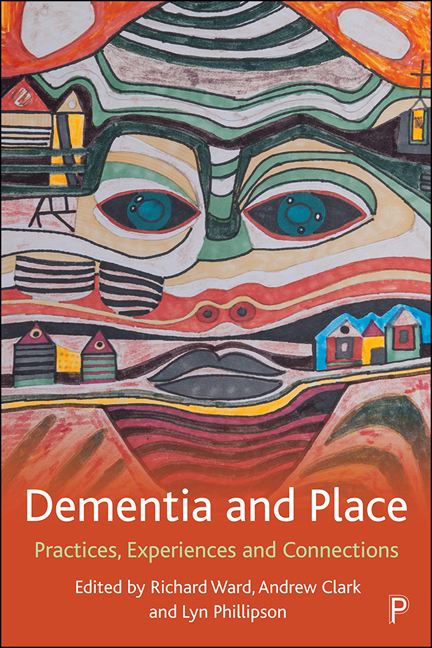Book contents
- Frontmatter
- Dedication
- Contents
- List of figures and tables
- Notes on contributors
- Acknowledgements
- 1 Introduction: Placing dementia
- 2 Understanding the meaning of neighbourhoods for people living with dementia: the value of a relational lens
- 3 Moving house with dementia
- 4 How do people with dementia manage problematic situations in public spaces?
- 5 Making and maintaining neighbourhood connections when living alone with dementia
- 6 My neighbourhood, my future ...?
- 7 Enabling the neighbourhood: a case for rethinking dementia-friendly communities
- 8 A conceptual framework of the person– environment interaction in the neighbourhood among persons living with dementia: a focus on out-of-home mobility
- 9 We’re known as ‘the girls’ around town: support, isolation and belonging for a lesbian couple living with dementia
- 10 Building community capacity for dementia in Canada: new directions in new places
- 11 The good, the challenging and the supportive: mapping life with dementia in the community
- 12 Growing back into community: changes through life with dementia
- 13 Dementia, tourism and leisure: making the visitor economy dementia friendly
- 14 Conclusion: Dementia emplaced
- Index
13 - Dementia, tourism and leisure: making the visitor economy dementia friendly
Published online by Cambridge University Press: 13 May 2022
- Frontmatter
- Dedication
- Contents
- List of figures and tables
- Notes on contributors
- Acknowledgements
- 1 Introduction: Placing dementia
- 2 Understanding the meaning of neighbourhoods for people living with dementia: the value of a relational lens
- 3 Moving house with dementia
- 4 How do people with dementia manage problematic situations in public spaces?
- 5 Making and maintaining neighbourhood connections when living alone with dementia
- 6 My neighbourhood, my future ...?
- 7 Enabling the neighbourhood: a case for rethinking dementia-friendly communities
- 8 A conceptual framework of the person– environment interaction in the neighbourhood among persons living with dementia: a focus on out-of-home mobility
- 9 We’re known as ‘the girls’ around town: support, isolation and belonging for a lesbian couple living with dementia
- 10 Building community capacity for dementia in Canada: new directions in new places
- 11 The good, the challenging and the supportive: mapping life with dementia in the community
- 12 Growing back into community: changes through life with dementia
- 13 Dementia, tourism and leisure: making the visitor economy dementia friendly
- 14 Conclusion: Dementia emplaced
- Index
Summary
Introduction
This chapter takes as its inspiration the well-established idea of living well with dementia and how this somewhat vague and contested idea might be effectively operationalised through an application to leisure and tourism businesses and activities. The purpose of this chapter is to give an overview of a nascent area of dementia-friendly activity: that of the visitor economy, which encompasses the range of businesses, services and spaces used by visitors to a neighbourhood, and often by local residents too. The interactions in, and value of, the largely neglected visitor economy concept within dementia studies is important as businesses and organisations that manage and promote place-based experiences and activities can enrich the lives of people with dementia, and their families and carers. This is relevant not only to visitors to a locale, but also to local residents, who also use and benefit from visitor economy businesses and services.
We review a programme of research that we have been pursuing to raise the profile of the visitor economy as an issue within both academic and practitioner agendas through tools and advocacy. Our principal focus throughout this research programme, which has involved different stakeholders (including those impacted by dementia in the community, and businesses and organisations that have responsibility for service delivery), is to enhance the accessibility of the visitor economy for people with dementia, thereby opening up neighbourhoods more fully so as to address a broader civil society objective of enhancing participation. This chapter also seeks to conceptualise these places as not just existing for residents, but also for visitors, and that people living with dementia exist in both categories. Our coverage in this chapter is necessarily selective but we seek to highlight some of the key dementia-related issues associated with the visitor economy and research and strategic responses that are starting to drive principles and practice forward. Our focus is on Great Britain although the principles we discuss have equal applicability within an international context.
Tourism and leisure as part of a dementia-friendly neighbourhood
Leisure as a broad concept encompasses a diverse spectrum of activity that incorporates long-haul travel through to going for a swim at a leisure centre and to home-based activities, such as knitting or watching television (see Page and Connell, 2010).
- Type
- Chapter
- Information
- Dementia and PlacePractices, Experiences and Connections, pp. 191 - 207Publisher: Bristol University PressPrint publication year: 2021



